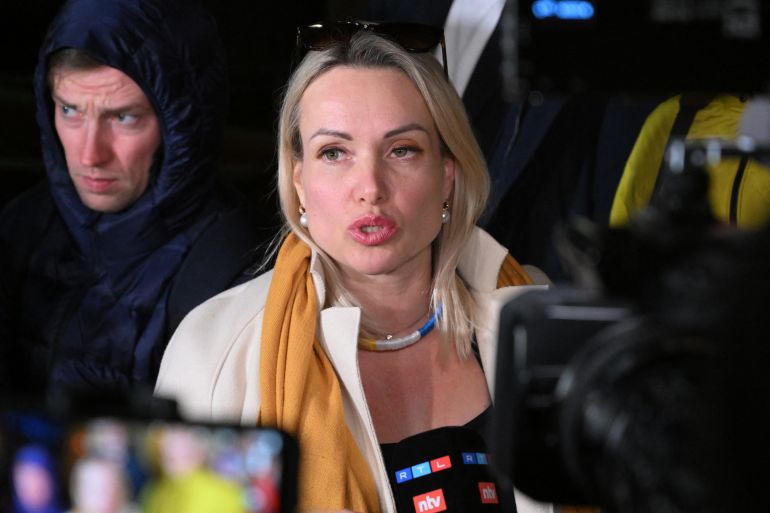Russian on-air protester fined, faces possible prison term
Marina Ovsyannikova was fined $270 for a prerecorded video where she called on Russians to join antiwar protests.

An employee of Russian state television who interrupted a live news programme to protest against the war in Ukraine has been released from custody and fined about $270 – but still could face a prison sentence.
Marina Ovsyannikova staged an extraordinary show of dissent on Monday night when she held up an anti-war sign behind a studio presenter reading the news on Channel One and shouted slogans condemning Russia’s invasion of Ukraine.
Keep reading
list of 3 itemsFears mount over ‘missing’ Russian anti-war TV protester
UK blacklists 350 more Russians, imposes new import tariffs
The fine meted out to her on Tuesday was related to a video she had recorded before her protest in Channel One’s studio, in which she urged Russians to join antiwar protests.
“Russia is the aggressor country and one person, Vladimir Putin, solely bears responsibility for that aggression,” she said in the prerecorded video, referring to Russia’s president who ordered troops into Ukraine on February 24.
Ovsyannikova, who had worked for Channel One for several years, added that she was ashamed to be delivering “Kremlin propaganda”.
“I am ashamed that I allowed lies to be broadcast from TV screens. Ashamed that I allowed others to zombify Russian people,” she said, urging Russians to go out and demonstrate.
State news agency Tass said Ovsyannikova remains under investigation for the on-air protest under a law banning dissemination of “deliberately false information” about the use of Russian armed forces. The new law carries a maximum 15-year prison sentence.
Ukraine’s President Volodymyr Zelenskyy thanked the protester in his nightly video address.
“I am grateful to those Russians who do not stop trying to convey the truth. To those who fight disinformation and tell the truth, real facts to their friends and loved ones,” Zelenskyy said. “And, personally, to the woman who entered the studio of Channel One with a poster against the war.”
Earlier on Tuesday, Kremlin spokesman Dmitry Peskov described Ovsyannikova’s protest in the Channel One studio as “hooliganism”.
“The channel and those who are supposed to will get to the bottom of this,” he told reporters, describing Channel One as a pillar of objective and timely news.
Kira Yarmysh, spokeswoman for jailed opposition leader Alexey Navalny, wrote on Twitter: “Wow, that girl is cool.” She posted a video of the incident, which quickly racked up more than 2.6 million views.
⚡️⚡️ ПРОПАГАНДИСТЫ ОТРЕКАЮТСЯ ОТ ПУТИНА https://t.co/d2HrrQGd5h
— Кира Ярмыш (@Kira_Yarmysh) March 14, 2022
Translation: Propagandists reject Putin
State TV is the main source of news for many millions of Russians, and closely follows the Kremlin line that Russia was forced to act in Ukraine to demilitarise and “de-nazify” the country, and to defend Russian-speakers there against “genocide”.
Ukraine and most of the world have condemned that as a false pretext for an invasion of a democratic country.
After the hearing, Ovsyannikova told reporters she was exhausted, had been questioned for more than 14 hours, had not been allowed to speak to her relatives and was not provided with legal assistance. She said she needed to rest before commenting further.
Her protest had stirred fears among her sympathisers that she could be prosecuted under the new legislation.
The law, passed on March 4, makes public actions aimed at discrediting Russia’s army illegal and bans the spread of fake news or the “public dissemination of deliberately false information about the use of the Armed Forces of the Russian Federation”.
Russian authorities have repeatedly decried reports of Russian military setbacks or civilian deaths in Ukraine as “fake” reports. State media outlets refer to Russia’s invasion of Ukraine as a “special military operation” rather than a “war” or “invasion”.
So far more than 14,000 people have been arrested across cities in Russia for protesting against the war, according to independent monitoring group OVD-Info.